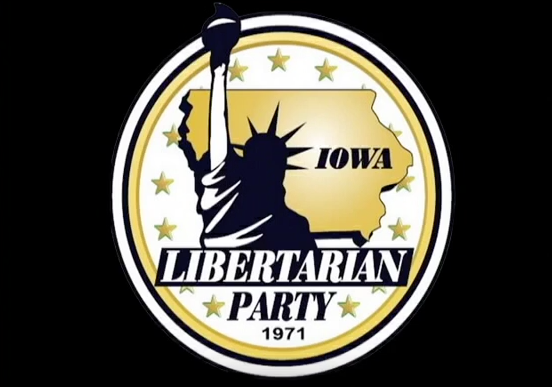The Libertarian Party of Iowa will become a non-party political organization again after two years on the same legal footing as the Democratic and Republican parties. Unofficial results show Libertarian nominee Jake Porter received 21,095 votes for governor, about 1.6 percent of the statewide vote.
Iowa law defines a political party as an organization whose nominee for president or governor “received at least 2 percent of the total votes cast at the last general election.” Libertarians gained that status after Gary Johnson received nearly 4 percent of the 2016 presidential vote in Iowa.
Although Porter improved slightly on the 20,321 votes Lee Hieb received in the 2014 governor’s race, the Libertarian share of the vote decreased due to unusually high turnout for a non-presidential year in Iowa.
Political parties in Iowa can hold primary elections, and Libertarians filed for the June primary in some races. The party nominated more candidates over the summer, eventually competing for every statewide office and Congressional district and about two dozen state legislative seats or local offices.
As a non-party political organization, Libertarians will be able to nominate candidates for Iowa’s general election ballot, either by collecting signatures on petitions or by holding special nominating conventions. Nevertheless, losing major-party status is a blow to the party’s aspirations.
I sought Porter’s thoughts today on why he fell short of the 2 percent threshold. He responded,
While I haven’t had a chance to do a real detailed analysis, it appears we did about the same statewide which leads me to think our strategy worked. In the past, Libertarian candidates would have pockets of support and do bad in rural areas for example.
We had [lieutenant governor nominee] Lynne Gentry out campaigning in northern Iowa and I did as many TV appearances, newspaper and radio interviews as possible. The idea was the media coverage would boost our totals. It appears to have somewhat worked.
I would guess the close contest between Hubbell and Reynolds hurt Porter. If one of them had been perceived as a huge favorite to win the governor’s race, more Iowans might have been willing to support a Libertarian. Porter agreed: “I think that was the case. About a week and a half ago, I noticed the wasted vote arguement was more prevalent than usual.”
Porter added that the YouTube ads his campaign produced may not have had the impact they were hoping for. In contrast, his media appearances led to higher name recognition than he had as the secretary of state candidate on the Libertarian ticket in 2010 and 2014. This year, many more people recognized Porter in public.
Governor Kim Reynolds refused to participate in any debates including the Libertarian nominee, which hurt his ability to communicate with large numbers of engaged voters. However, Porter told me, “I do not buy the excuse that being kept out of the debates cost us party status.” One task for the future: putting a “county party infrastructure in place to do GOTV,” which was lacking for this election.
Porter wrote this Facebook post to supporters on November 7.
Last night, I spoke with Governor Reynolds and congratulated her on her victory. I also called and spoke to Mr. Hubbell’s campaign staff and thanked them for including us in the debate discussions this year.
I want to thank all of my staff, supporters, donors, and voters that have helped me out over the past year. I also want to thank my running mate Lynne Gentry who did a fabulous job campaigning in Northern Iowa. Unfortunately, we did not achieve the results we wanted or expected. The amount of media coverage we received was not enough to keep our party status in Iowa when the votes came in. That said, the party will continue to build local organizations and be back with official party status in no time.
I don’t believe in blaming others or making excuses. The media coverage and video ad strategy I used didn’t work. I accept full responsibility and I am sorry for letting you down.
You have no idea how much your support means to me. I just hope we were able to inspire someone or create some positive change for our state somehow. Thank you for everything.
In Liberty,
Jake
P.S.- The Green Party gained full political party status when presidential candidate Ralph Nader received more than 2 percent of the vote in Iowa in 2000. After Jay Robinson gained just under 1.5 percent in the 2002 governor’s race, Greens mostly abandoned serious organizing efforts in Iowa. The only Green candidate on this year’s general election ballot was Paul Knupp, who failed to collect enough signatures to qualify for the Democratic primary in the third Congressional district. He received 1,794 votes, about 0.5 percent.


2 Comments
If the race had been significantly tighter...
…the 7,341 votes for Gary Siegwarth might possibly have made the difference between Hubbell winning and losing. Do we have reason to be concerned about this kind of situation in the future? It seems possible that in the near future, Iowa could have even tighter races in an even more divided state.
PrairieFan Wed 7 Nov 11:08 PM
wut
What’s your logic on that one? Hubbell finished with 39,529 votes than Reynolds. Even Porter’s and Siegwarth’s combined vote total wouldn’t have been enough to give Hubbell the win.
coryiniowa Thu 8 Nov 6:29 PM